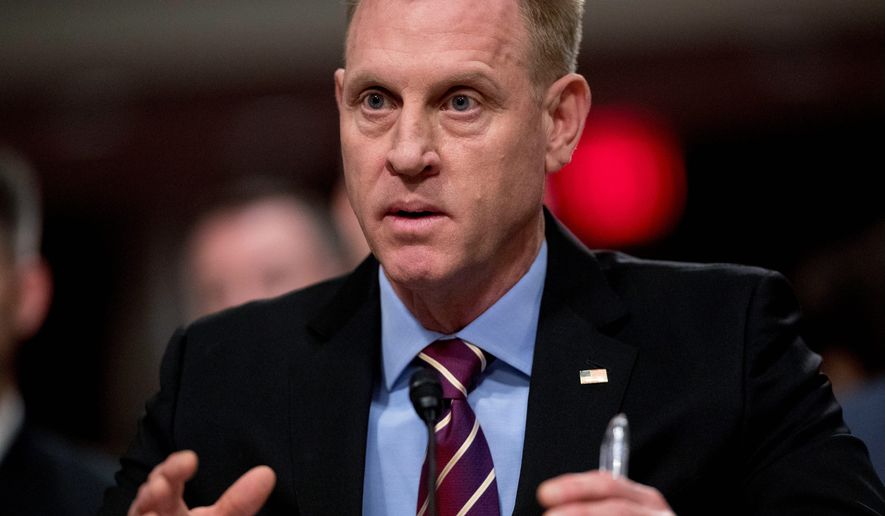By ordering another look at a deadly 2017 ambush of U.S. troops in Niger, acting Defense Secretary Patrick M. Shanahan could put his own stamp on America’s role in Africa — and attempt to reassure a skeptical Congress that he’s fully capable of managing thorny politics inside the Pentagon on a permanent basis.
The acting defense secretary recently called for a fresh review of the attack that killed four U.S. Green Berets and sparked a political backlash at home from lawmakers who said they’d been kept in the dark about America’s actions in Niger and across the continent. An initial Pentagon review found numerous parties responsible, and while some military figures have been punished, critics have said the Defense Department has laid most of the blame at the feet of junior officers while letting higher-ranking officers mostly off the hook.
The new study reportedly will be led by Gen. Robert Brown, the head of U.S. Army Pacific.
While he could have allowed the first report to stand, Mr. Shanahan instead has chosen to send a signal that he’s taking ownership of even the most complex military matters, specialists say, including those that originated under his predecessor, former Marine Gen. James Mattis. The review could lay the foundation for changes to how U.S. forces conduct counterterrorism efforts in Africa and also could build the case to punish more powerful military officers — both steps, analysts believe, that could bolster the acting secretary’s bona fides inside the Pentagon at a time he’s privately lobbying to be nominated for the permanent position.
“He’s saying ’I’m in charge of the Department of Defense. Something that happened under my predecessor but is not fully reconciled is going to be done correctly,’” said Steven Bucci, a national security fellow at the conservative Heritage Foundation who served 30 years in U.S. Special Forces.
The acting secretary will face immense pressure as the probe proceeds, Mr. Bucci added, with two camps inside the Pentagon — those who want concrete punishment in response to the raid and perhaps even a scaled-down mission in Africa vs. those who don’t — making their pitches to Mr. Shanahan.
“How he deals with making this subsequent double check, it’ll tell you something,” Mr. Bucci said.
The Green Berets and four Nigerien soldiers were killed in the Oct. 4, 2017, ambush. The U.S. forces deployed alongside their Nigerian counterparts in pursuit of a militant affiliated with the Islamic State.
Unable to locate the target, the forces began to return to their bases but were ambushed near the village of Tongo Tongo in what appeared to be a pre-planned enemy assault.
Quick process
Pentagon officials say the new review of the incident won’t represent an entirely new investigation. Instead, Gen. Brown is expected to review the existing findings and determine whether additional punishments are in order.
Mr. Shanahan, who took over as acting defense chief on Jan. 1, said the process will unfold quickly.
“I’m not trying to delay a report out,” he said earlier this month. “When I undertook the role, I wanted time to review the investigation, and really this is just a kind of expedited way for me to make sure I have enough time to understand the reports and the details, so I expect this to go very, very quickly.”
On Capitol Hill, lawmakers have sounded the alarm on two aspects of the ill-fated Niger mission: the secrecy of the exact role of U.S. forces in the country and elsewhere across the continent, and the fact that the Pentagon so far has not called for the explicit punishment of high-ranking officers overseeing forces in Niger.
“It seems to me is that we’re going to place blame on junior officers, and we’re letting colonels and general officers just get off the hook,” Rep. Ruben Gallego, Arizona Democrat, said during a recent House Armed Services Committee hearing.
In its initial review, released in May 2017, the Pentagon found that while the U.S. Special Operations Forces teams inside Niger “have the authority to conduct [counterterrorism] operations with partner Nigerien forces, the initial concept of operations (CONOPS) submitted for this mission was not approved at the proper level of command. Rather, the [Special Forces] commander and the next higher level commander at the Advanced Operations Base … inaccurately characterized the nature of the mission in the CONOPS.”
More broadly on Africa, military officials recently announced plans to begin drawing down the number of troops stationed on the continent. But the Pentagon is denying that the drawdown means the U.S. no longer sees the continent as a priority.
“We are in no way indicating a lack of commitment to Africa. It is a location of strategic importance to the United States and our interests, and our allies interests,” Kathryn Wheelbarger, acting assistant secretary of defense for international security affairs, told The Washington Times in an interview.
The restructuring and reduction of U.S. Special Operations Forces in Africa reflect “successes [in the country] as well as global requirements” for those forces outside the continent, said Ms. Wheelbarger.
— Carlo Munoz contributed to this report.
• Ben Wolfgang can be reached at bwolfgang@washingtontimes.com.




Please read our comment policy before commenting.